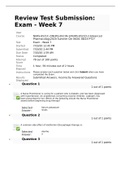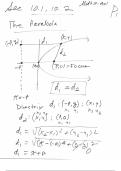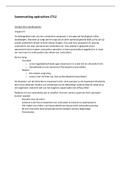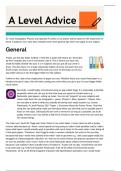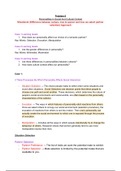CEP lecture 7 10-01-2019
Today I will tell you a litle it a out social complexity. A out agent- ased modeling. And a out transitons. One of essental
elements of life is that life always adapts to changing circumstances. These days we deal with all kinds of challenges.
Climate change. Issues of migraton. Welcome in our neigh ourhood, this is where we live (zie slide). This is 100.000 light
years.
This is it. This is our spaceship, the earth. All life we know is on this litle lue all. All your family, friends, anchestors, your
whole history has een taking place on this spaceship. This spaceship has very peculiar thing: DNA, life. That’s very special
a out this planet.
If we look at it. Evoluton of life. The plethora of diferent species. All the diferent parts of life that grow, emerge and
evolve on this planet. So are we, we are also travellers.
And of course we adapt. That’s one of the essental elements of life. Life always adapts to changing circumstances. That’s
what humans have een doing all over history. These days we deal with all kinds of challenges and struggles. Lot of
discussion on climate change, associated issues of migraton. Sometmes people think this is really something new.
But that’s not true. Look at this picture (landkaart). This gives tme perspectve on changes on this planet. Here we see a
kind of recent history of our life. We go ack 16.000 years. Then you see there are lines. If you go from 10.000 to 9.000
years ack in tme, you see that the sea covered a lot of land. So this rise of the sea is something quite common. This
happened a out 20 metres. 20 metres of sea rise. In the tme that modern man was there. That wasn’t the only thing. Have
you heard a out Storrega landslide? 7.500 years ago (5.500 B.C.) at the coast of Norway there was a piece of rock at the
size of Iceland that moved into the sea, creatng a tsunami that was that ig that it fushed all over Doggerland. Has een a
natural disaster. We hardly know anything a out it. Why we are a litle it more aware a out that these days is ecause
they are drilling operatons going on. People (geologists) are concerned that with extracton of oil and gas, underyling soil
could ecome insta le and such a slide of land could happen again.
So, changes happen. These are the people that were confronted with these kind of events.
These days when we talk a out the rise of the sea, storms and so on, a focal point at this moment is Kiri at, group of
islands. Here you see them. These people are vulnera le. The sea is really coming into the island. People have a hard tme.
At this moment this is focal point: Who is responsi le and who should help people that sufer from climate change? If it is
the case that car on dioxide emissions produced y humans are responsi le for that, who is then lia le for solving this
pro lem, for helping these people, for a sor ing these people in their country? Complicated questons that may take years
and years to study and explore. Big challenges for humanity.
If we look into the future, this is a map that is confrontng us with a possi le future. It’s not to make you afraid, ut to
stmulate you to think that things may change in the future, juust as we had majuor changes in the past. Big challenge for
humanity to not only try to preserve what we have, ecause a lot of people think “we should stop climate change”, well
perhaps that is not possi le at all, we also should e capa le of adaptng to change. If changes happen, what can we do?
Look at the map. The yellow zones are ecoming uninha ita le, that is an expectaton given that the temperature will rise
with 4 degrees. Might e imagina le ecause of the emissions. This might e a scenario that could ecome real. Interestng
that Antarctca will ecome ha ita le (food growing zones and compact high rise cites) and that the coast of Greenland will
e interestng to start living (food growing zones and compact high rise cites). Russian administraton is going to change.
Sy eria which is now a tough region to live, might ecome much more appealing to inha it, to produce food and so on.
We’re thinking that climate change has only negatve efects (and it indeed can have really negatve outcomes) ut never
forget there might also e positve outcomes, if we as man kind learn to adapt to changing circumstances, we also should
e very sensitve to possi le positve developments and try to capitalise on that. The russians have a lot of possi ilites.
How do we respond to these kind of ig challenges? Do we take the role of super hero and are we going to change the
world? Ofen, young people, students or even kids, when I was a small kid I did actons for seals and things like that.
When people grow older they turn into ostriches (=struisvogels). We don’t really want to see the pro lem. Perhaps we have
to change our lives and that’s quite an efort. No ody is really doing that much, we keep driving cars etc, so why should I e
the first to adjuust my life? It’s temptng to e a litle it aware of the pro lem ut also in daily life neglect it to a large
extent. Interestng thing where individual ehavior and group/collectve/cultural ehavior are supportng each other.
To understand more how people operate in these kind of circumstances, we need to understand how we operate as a
species, not only as individuals, ut as a group of people. So, an evolutonary perspectve on needs. Important o servaton
is that our rain is not an unity, our rain has a evolutonary history. It has diferent parts with diferent genetc age. Some
parts are more reptle kind of structures, they do not really have a long term vision. And we have very strong mammalian
part of our rain, which is very social and group-oriented ut not very capa le of language. And we have the curved thing
on top of it, the top layer, the cortex, which is capa le of language. When you ask people, if you take interviews or
, questonnaires, you ask the cortex, you don’t ask the deeper rain systems what they think or feel a out it. The cortex
always comes up with nice explanatons. Very good at ratonalizing our ehavior, ut that does not mean that we are
ratonalized.
If we go deeper into this rain and we focus on the social rain of the modern man, it’s good to realize that we have een
living as hunter gatherers in groups of 150 people for 10.000 generatons. That’s a long tme. Wander Jager raadt oek
Sapiens aan. Briljuant ook, tells you a lot a out where we come from. This is the situaton that we’ve een encountering for
10.000 generatons. We were living in small groups, the maximum num er of meaningful relatons with people who we
really knew was a out 150 people (Dun ar num er), that’s the num er our rain can cope with. Imagine how many
Face ook friends you have, or Instagram connectons. We are living in a diferent age right now ut we stll have an old
rain.
Social decision making. Our rain is hard-wired to pick up informaton from other people. We are very skilled in taking in
experiences from other people. Whereas economical perspectve focuses on individual decision making, we have to realize
we are a species and that when there’s something new or deviant ehavior, most people are scrutnizing carefully what is
happening this is interestng, can I learn something from it? This is how our species operate.
I go deeper into that. Important is also to realize, that diferent rain systems have diferent needs. Here is the old-
fashioned pyramid of Maslow of needs (now there are more modern needs). Physiological – safety – elonging and love –
esteem – self-actualizaton – self-transcendence. Physiological needs and safety needs is related to very old rain systems.
Reptles have those needs. But self-actualisaton or self-transcendence, sometmes I think that my cat is transcending, ut
that is my o servaton, I think that in general those are the issues for high primates like dolphins and humans (species with
ela orate cortex). So, the higher in the pyramid, the more the needs are for high primates. This confronts us with conficts
in our own mind. Smoking is an example explaining how the rain can operate. The cogniton, the top level, is very well
aware that on the long term, it’s not a healthy ha it. But the deeper rain systems are not aware of long-term outcomes
and they will encourage you to smoke (you deserved one, you need a short term kick). It’s the same when you are sitng
with a ag of crisps or chocolate in front of the TV and know you should stop eatng. There you can see confict etween
longer term thinking of cortex and shorter term orientaton of the deeper rain system. We are not an unity. We are a
multplicity in our rain.
We are not only individuals, ut all these rains are coupled. That makes our species interestng ecause if one rain is
discovering something, a partcular ehavior, other ones can pick it up, they can for example learn or follow the norm. And
ehavior can spread throughout network of connected rains and connected people. On a diferent place someone else can
come up with another idea, another perspectve, and this can also spread through society. Sometmes this results in
conficts (rode en groene pijul tegenover elkaar). Increasingly, algorhytms feed us with informaton of people that we agree
with. As a result of that, collectve groups of people are living in a partcular u le. Friends of mine in the United States are
lef-li erate. I try to e as open minded as possi le, I follow politcians all over the spectrum and I try to get as much news
as possi le. But my lef-wing friends in the US are confined in a u le. The only stuf they share on Face ook is cartoons
on Trump. There’s no dialogue going on. It’s only eing ant-Trump. Just like the people that are supportng Trump are
always ashing democrates. It’s a polarized situaton. It’s a concern to me that in this u ly tme the skill of having a good
dialogue seems to e forgoten y many people.
We are very much a social species. Essental that we have this capacity of learning from other people. But learning seems to
e much more cognitve. Social processes are ofen way deeper, not cognitve ut go deeper, more to mammalian rain.
Then we are entering on the world of normatve infuences. Watch this movie and do at the same tme introspecton. Feel
when it’s incomforta le to juoin dancing and when for you the situaton turns into hey now I would like to juoin dancing.
Wander Jager shows movie of a guy that started a dance party y eginning to dance on his own. In the eginning most of
you would feel uncomforta le juoining in. Could you feel that later on the situaton changes? In the eginning it’s awkward
to juoin dancing. But at the moment that a lot of people start dancing with him and you see this group emerging, you feel
that it ecomes safe to juoin, you are not deviatng from the norm anymore when you juoin the dance. You are not standing
out. You have the safety of the group. It ecomes much more socially accepta le to juoin the dance. If you are not dancing at
the end, then you are violatng the norm and you are excluding yourself from the crowd that starts dancing. That
demonstrates that changing ehavior is very ofen driven y these kind of social deep drives. That’s very important to
understand how we as species very ofen change our ehavior in group situatons.
This is the classical innovaton difusion curve. Innovators are the people that start dancing. They don’t care too much what
other people think of them. They see their individual enefit. They start dancing ecause they like dancing. Perhaps they
even like to deviate from waht other people are doing. Like artsts, they derive pleasure from deviatng from the rest. By
deviatng they create a startng point for sometmes new ehavior. When you have a critcal mass of people, if there are
sufficient people juoining in, then it ecomes safe and a new norm is esta lished and new ehavior ecomes atractve, and
when it’s safe for the majuority, then many more people juoin in and then you see the movement towards spreading of new
ehavior.
Today I will tell you a litle it a out social complexity. A out agent- ased modeling. And a out transitons. One of essental
elements of life is that life always adapts to changing circumstances. These days we deal with all kinds of challenges.
Climate change. Issues of migraton. Welcome in our neigh ourhood, this is where we live (zie slide). This is 100.000 light
years.
This is it. This is our spaceship, the earth. All life we know is on this litle lue all. All your family, friends, anchestors, your
whole history has een taking place on this spaceship. This spaceship has very peculiar thing: DNA, life. That’s very special
a out this planet.
If we look at it. Evoluton of life. The plethora of diferent species. All the diferent parts of life that grow, emerge and
evolve on this planet. So are we, we are also travellers.
And of course we adapt. That’s one of the essental elements of life. Life always adapts to changing circumstances. That’s
what humans have een doing all over history. These days we deal with all kinds of challenges and struggles. Lot of
discussion on climate change, associated issues of migraton. Sometmes people think this is really something new.
But that’s not true. Look at this picture (landkaart). This gives tme perspectve on changes on this planet. Here we see a
kind of recent history of our life. We go ack 16.000 years. Then you see there are lines. If you go from 10.000 to 9.000
years ack in tme, you see that the sea covered a lot of land. So this rise of the sea is something quite common. This
happened a out 20 metres. 20 metres of sea rise. In the tme that modern man was there. That wasn’t the only thing. Have
you heard a out Storrega landslide? 7.500 years ago (5.500 B.C.) at the coast of Norway there was a piece of rock at the
size of Iceland that moved into the sea, creatng a tsunami that was that ig that it fushed all over Doggerland. Has een a
natural disaster. We hardly know anything a out it. Why we are a litle it more aware a out that these days is ecause
they are drilling operatons going on. People (geologists) are concerned that with extracton of oil and gas, underyling soil
could ecome insta le and such a slide of land could happen again.
So, changes happen. These are the people that were confronted with these kind of events.
These days when we talk a out the rise of the sea, storms and so on, a focal point at this moment is Kiri at, group of
islands. Here you see them. These people are vulnera le. The sea is really coming into the island. People have a hard tme.
At this moment this is focal point: Who is responsi le and who should help people that sufer from climate change? If it is
the case that car on dioxide emissions produced y humans are responsi le for that, who is then lia le for solving this
pro lem, for helping these people, for a sor ing these people in their country? Complicated questons that may take years
and years to study and explore. Big challenges for humanity.
If we look into the future, this is a map that is confrontng us with a possi le future. It’s not to make you afraid, ut to
stmulate you to think that things may change in the future, juust as we had majuor changes in the past. Big challenge for
humanity to not only try to preserve what we have, ecause a lot of people think “we should stop climate change”, well
perhaps that is not possi le at all, we also should e capa le of adaptng to change. If changes happen, what can we do?
Look at the map. The yellow zones are ecoming uninha ita le, that is an expectaton given that the temperature will rise
with 4 degrees. Might e imagina le ecause of the emissions. This might e a scenario that could ecome real. Interestng
that Antarctca will ecome ha ita le (food growing zones and compact high rise cites) and that the coast of Greenland will
e interestng to start living (food growing zones and compact high rise cites). Russian administraton is going to change.
Sy eria which is now a tough region to live, might ecome much more appealing to inha it, to produce food and so on.
We’re thinking that climate change has only negatve efects (and it indeed can have really negatve outcomes) ut never
forget there might also e positve outcomes, if we as man kind learn to adapt to changing circumstances, we also should
e very sensitve to possi le positve developments and try to capitalise on that. The russians have a lot of possi ilites.
How do we respond to these kind of ig challenges? Do we take the role of super hero and are we going to change the
world? Ofen, young people, students or even kids, when I was a small kid I did actons for seals and things like that.
When people grow older they turn into ostriches (=struisvogels). We don’t really want to see the pro lem. Perhaps we have
to change our lives and that’s quite an efort. No ody is really doing that much, we keep driving cars etc, so why should I e
the first to adjuust my life? It’s temptng to e a litle it aware of the pro lem ut also in daily life neglect it to a large
extent. Interestng thing where individual ehavior and group/collectve/cultural ehavior are supportng each other.
To understand more how people operate in these kind of circumstances, we need to understand how we operate as a
species, not only as individuals, ut as a group of people. So, an evolutonary perspectve on needs. Important o servaton
is that our rain is not an unity, our rain has a evolutonary history. It has diferent parts with diferent genetc age. Some
parts are more reptle kind of structures, they do not really have a long term vision. And we have very strong mammalian
part of our rain, which is very social and group-oriented ut not very capa le of language. And we have the curved thing
on top of it, the top layer, the cortex, which is capa le of language. When you ask people, if you take interviews or
, questonnaires, you ask the cortex, you don’t ask the deeper rain systems what they think or feel a out it. The cortex
always comes up with nice explanatons. Very good at ratonalizing our ehavior, ut that does not mean that we are
ratonalized.
If we go deeper into this rain and we focus on the social rain of the modern man, it’s good to realize that we have een
living as hunter gatherers in groups of 150 people for 10.000 generatons. That’s a long tme. Wander Jager raadt oek
Sapiens aan. Briljuant ook, tells you a lot a out where we come from. This is the situaton that we’ve een encountering for
10.000 generatons. We were living in small groups, the maximum num er of meaningful relatons with people who we
really knew was a out 150 people (Dun ar num er), that’s the num er our rain can cope with. Imagine how many
Face ook friends you have, or Instagram connectons. We are living in a diferent age right now ut we stll have an old
rain.
Social decision making. Our rain is hard-wired to pick up informaton from other people. We are very skilled in taking in
experiences from other people. Whereas economical perspectve focuses on individual decision making, we have to realize
we are a species and that when there’s something new or deviant ehavior, most people are scrutnizing carefully what is
happening this is interestng, can I learn something from it? This is how our species operate.
I go deeper into that. Important is also to realize, that diferent rain systems have diferent needs. Here is the old-
fashioned pyramid of Maslow of needs (now there are more modern needs). Physiological – safety – elonging and love –
esteem – self-actualizaton – self-transcendence. Physiological needs and safety needs is related to very old rain systems.
Reptles have those needs. But self-actualisaton or self-transcendence, sometmes I think that my cat is transcending, ut
that is my o servaton, I think that in general those are the issues for high primates like dolphins and humans (species with
ela orate cortex). So, the higher in the pyramid, the more the needs are for high primates. This confronts us with conficts
in our own mind. Smoking is an example explaining how the rain can operate. The cogniton, the top level, is very well
aware that on the long term, it’s not a healthy ha it. But the deeper rain systems are not aware of long-term outcomes
and they will encourage you to smoke (you deserved one, you need a short term kick). It’s the same when you are sitng
with a ag of crisps or chocolate in front of the TV and know you should stop eatng. There you can see confict etween
longer term thinking of cortex and shorter term orientaton of the deeper rain system. We are not an unity. We are a
multplicity in our rain.
We are not only individuals, ut all these rains are coupled. That makes our species interestng ecause if one rain is
discovering something, a partcular ehavior, other ones can pick it up, they can for example learn or follow the norm. And
ehavior can spread throughout network of connected rains and connected people. On a diferent place someone else can
come up with another idea, another perspectve, and this can also spread through society. Sometmes this results in
conficts (rode en groene pijul tegenover elkaar). Increasingly, algorhytms feed us with informaton of people that we agree
with. As a result of that, collectve groups of people are living in a partcular u le. Friends of mine in the United States are
lef-li erate. I try to e as open minded as possi le, I follow politcians all over the spectrum and I try to get as much news
as possi le. But my lef-wing friends in the US are confined in a u le. The only stuf they share on Face ook is cartoons
on Trump. There’s no dialogue going on. It’s only eing ant-Trump. Just like the people that are supportng Trump are
always ashing democrates. It’s a polarized situaton. It’s a concern to me that in this u ly tme the skill of having a good
dialogue seems to e forgoten y many people.
We are very much a social species. Essental that we have this capacity of learning from other people. But learning seems to
e much more cognitve. Social processes are ofen way deeper, not cognitve ut go deeper, more to mammalian rain.
Then we are entering on the world of normatve infuences. Watch this movie and do at the same tme introspecton. Feel
when it’s incomforta le to juoin dancing and when for you the situaton turns into hey now I would like to juoin dancing.
Wander Jager shows movie of a guy that started a dance party y eginning to dance on his own. In the eginning most of
you would feel uncomforta le juoining in. Could you feel that later on the situaton changes? In the eginning it’s awkward
to juoin dancing. But at the moment that a lot of people start dancing with him and you see this group emerging, you feel
that it ecomes safe to juoin, you are not deviatng from the norm anymore when you juoin the dance. You are not standing
out. You have the safety of the group. It ecomes much more socially accepta le to juoin the dance. If you are not dancing at
the end, then you are violatng the norm and you are excluding yourself from the crowd that starts dancing. That
demonstrates that changing ehavior is very ofen driven y these kind of social deep drives. That’s very important to
understand how we as species very ofen change our ehavior in group situatons.
This is the classical innovaton difusion curve. Innovators are the people that start dancing. They don’t care too much what
other people think of them. They see their individual enefit. They start dancing ecause they like dancing. Perhaps they
even like to deviate from waht other people are doing. Like artsts, they derive pleasure from deviatng from the rest. By
deviatng they create a startng point for sometmes new ehavior. When you have a critcal mass of people, if there are
sufficient people juoining in, then it ecomes safe and a new norm is esta lished and new ehavior ecomes atractve, and
when it’s safe for the majuority, then many more people juoin in and then you see the movement towards spreading of new
ehavior.



